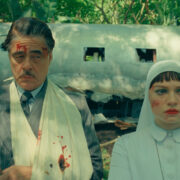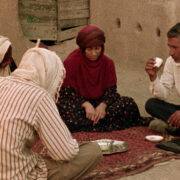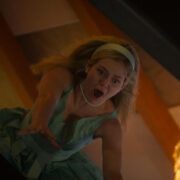The Beginner’s Guide: Park Chan-wook, Director
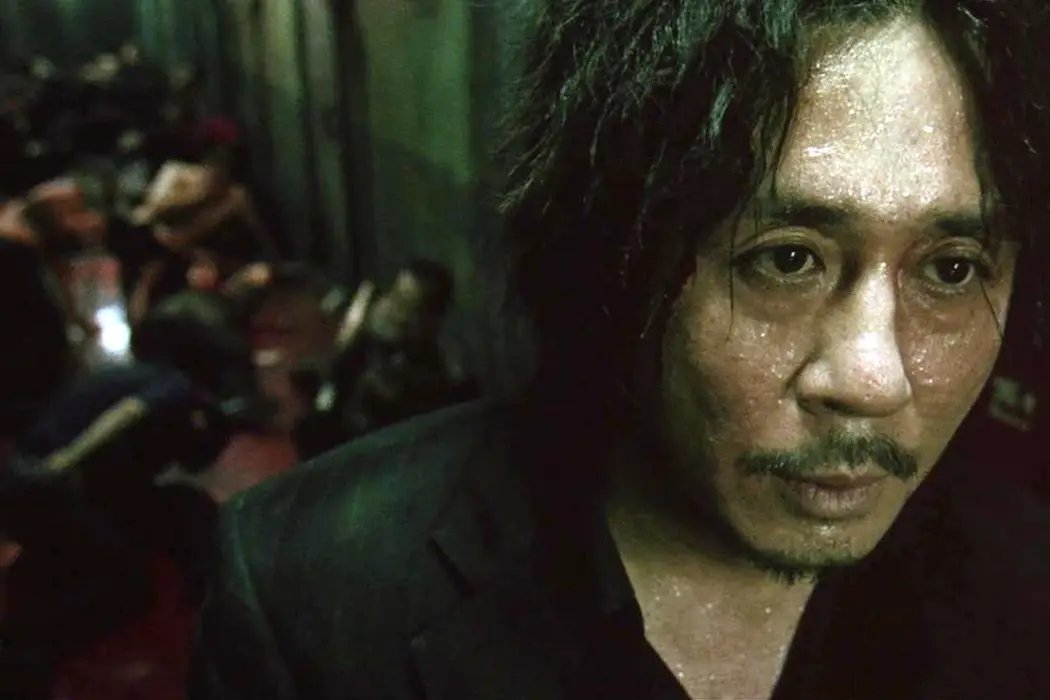
Jack is a recent MA Graduate from the film department…
One of the most successful directors from South Korea, the director Park Chan-wook was born on August 23rd, 1963. Initially considering himself a critic of art and film, it was after viewing the 1958 Alfred Hitchc*ck film Vertigo that Chan-wook decided he was to become a filmmaker. He wrote articles for film journals after his graduation, and even became an assistant director for such successful South Korean films as Watercolour Painting in a Rainy Day (1989), learning from the esteemed director Kwak Jae-yong. Chan-wook, in 1992, made his debut feature film named The Moon is…The Sun’s Dream, but his rise to some degree of fame, both regionally and internationally, did not materialise until he directed Joint Security Area, a searingly political film about soldiers on the border between North and South Korea.
Park Chan-wook has since become known for his themes of vengeance and broken taboos, his signature directorial style of slow transitions and most of all, his excessive and notorious use of extreme violence, a theme that is associated most often with his ‘Vengeance Trilogy’. Along with directors such as Bong Joon-ho and Kim Ki-duk, Chan-wook is responsible for hugely increasing the profile of South Korean cinema in the international community, with his major hits even having the honour (and subsequent critical panning) of being remade for an English-speaking audience, such as the Spike Lee adaptation of Oldboy.
Chan-wook himself has already delved into the English speaking landscape himself, with his first feature for a Western audience being the Hitchc*ck inspired Stoker, and his television adaptation of John le Carré’s novel The Little Drummer Girl for the BBC airing at the time of writing. There has been no more interesting nor as important a time to look back on the career of Park Chan-wook and analyse the films that have made him such a pioneer for his country’s international cinematic standing – whether you have only seen ‘The Vengeance Trilogy’ or perhaps never seen any of his films at all, this is the perfect place to find out what you’ve been missing.
Joint Security Area (2002)
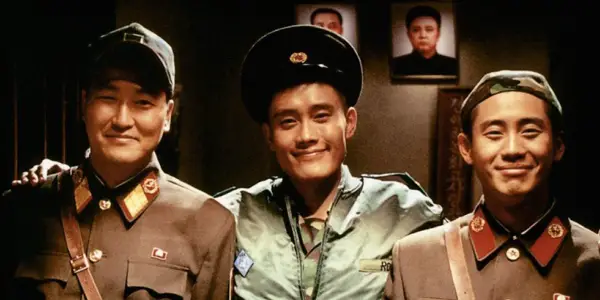
From the opening shots of an owl witnessing a murder, to the framing of a final photograph, this politically charged and devastatingly bleak thriller remains a fascinating early film from Park Chan-wook. A work mostly devoid of the ultra-violence that would set his films apart later in his career, Joint Security Area is a meditation on the nature of neutrality, with Lee Young-ae’s performance as Major Sophie Jean providing the calm, fascinatingly unbiased investigator into a violent event which has provoked tensions between South and North Korea. Her gaze is one of intelligence but also impatience, as the crime at the centre of the story is played out again and again in slightly different ways (in another director’s hands, this could have been a strange remake of Rashomon), and ultimately the concern of her character and of the audience is not what the truth is, but rather whether releasing the truth would be the morally right thing to do.
While some of the direction nor writing is quite as tight as some of the later films on this list, Joint Security Area still manages to astound with some breathtaking visual sequences, whether that be the wind blowing through a corn-field, a suicide that flips the entire camera upside-down, or spit that cross-cuts into the impact of bullets. The direction is slightly less controlled than one is used to with Chan-wook, but it is experimental and engaging in perhaps an even more thrilling way – this is clearly a less experienced director, and what the film lacks in a steely calmness it makes up for in an almost exuberant imagination of style and shot. The manner in which the narrative baits the audience into judging characters by nationalities, into believing stereotypes about the conflicts involved and about war in general, before sweeping the rug away from them, is endlessly fascinating.
Sympathy for Mr. Vengeance (2002)
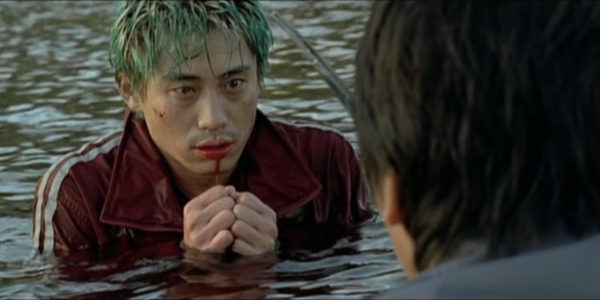
The first of the, at the time unplanned, ‘Vengeance Trilogy’, Sympathy for Mr. Vengeance is an extraordinarily angry piece of filmmaking; perhaps the least precisely controlled and yet most furiously watchable of Chan-wook‘s career. The visual style of the film may not be as striking as the two other films in the trilogy, both of which had larger budgets, yet Chan-wook‘s skill as a filmmaker of style and intelligence is never in question with this revenge thriller.
The whole point of ‘The Vengeance Trilogy’ was, as Chan-wook said himself, to explore the theme of revenge as a pointless and self-sabotaging motive for anything – each film watches on as an individual is wronged and then tries to rectify the balance of justice with violence and anger, and in each example the protagonist is found lacking not only justice at the end of the narrative but perhaps even simple satisfaction. That is most angrily portrayed and shockingly presented in this, the first of the trilogy, which even by Chan-wook‘s standards is a particularly nasty piece of cinema. It lacks the emotional intrigue of both Oldboy and Lady Vengeance and yet that almost works in its favour – it is almost comically black, absurd in its cynicism and its eye for the devilish details.
For an early indication of Chan-wook‘s early thematic intentions, with a style that was still revealing itself, Sympathy for Mr. Vengeance is an excellent beginning into the most grisly and famous chapter of Park Chan-wook‘s career so far.
Oldboy (2003)
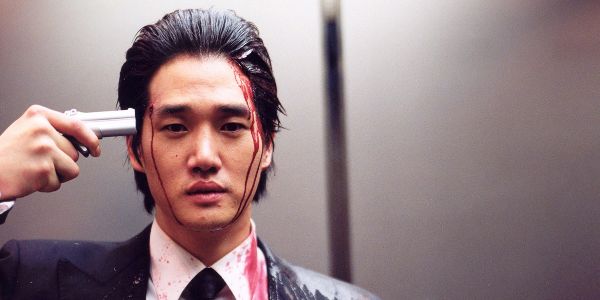
Park Chan-wook‘s most famous venture in filmmaking, Oldboy, is a shimmering haze of violence and broken characters, a nasty film that has captured the imagination, and the dread, of countless viewers. The middle section of ‘The Vengeance Trilogy’ is undoubtedly its most famous and that is perhaps in part due to its memorable premise – an individual, Oh Dae-Su, is imprisoned in what appears to be a hotel room for fifteen years without understanding why. He is finally released and his captor dares Dae-Su to track him down – both the antagonist and the protagonist crave vengeance, on each other and themselves, as the body-count stacks up and the famous twists of the film begin to slowly unravel. It is a deeply upsetting film, but Chan-wook‘s eye for beauty and his imaginative flair is never forgotten; the famous hallway fight has deeply infected Western culture with homages that can be seen in Marvel’s Daredevil, as well as a final sequence that, while having the most horrific questions to ask of the viewer, is drenched in natural beauty.
The unforgettable finale of Oldboy is likely the reason why the film has become so infamous with Western audiences – more so than either of the other two films in the thematic trilogy, Oldboy‘s violence creeps under the skin, thanks mostly to the apparent need, the necessity, for characters to commit these acts on both ourselves and each other. Self-mutilation in cinema would so often be seen as a tactic to generate shock within an audience, but in Oldboy the frightening aspect of the violence is how it asks us, the viewer, “wouldn’t you do it as well?” It is the glaring implications of his films, the unseen and unfathomable questions that they pose, that are at the heart of Park Chan-wook‘s filmography; that is never more apparent than in Oldboy.
Lady Vengeance (2005)
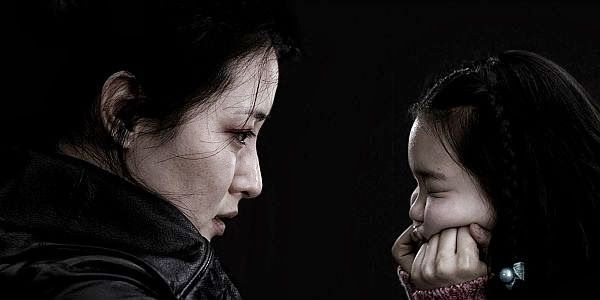
If there is one drawback to the success of Oldboy, it is that not enough attention and praise is lavished upon the final film of ‘The Vengeance Trilogy’, the unforgettable Lady Vengeance from 2005, sometimes known-as Sympathy for Lady Vengeance. Lee Young-ae from Joint Security Area turns in an extraordinary performance as Lee Guem-ja, a recently ‘reformed’ prisoner who was imprisoned for a horrific crime that she did not commit. Her angelic appearance hides her true intentions as she is released with the dual intentions of both finding her daughter, who was adopted during her incarceration, and finding and killing the real criminal of her prison-sentence.
Beautifully shot and perhaps the most emotional member of ‘The Vengeance Trilogy’, Lady Vengeance is a complicated feminist masterpiece that is less concerned with the act of revenge itself and more with who is allowed to go through with it. Revenge is almost framed as a bizarre opportunity for equality – if the villain wronged many people, should the grieving victims not all get an opportunity to receive a slice of revenge? This worrying thematic concern is coupled with a rather affecting story of single motherhood; Guem-ja is keenly aware that she has been robbed of many years with her daughter but, once the opportunity is given to her to finally spend some time with her, she is too obsessed with revenge, too fixated on making somebody pay for those lost years that she poses the risk of losing time all the more. Whereas the twists and intricacies of Oldboy are deliberately messy, nasty in their complications, Lady Vengeance is a streamlined tale of the lengths that women, and families, will go to punish the men that wrong them.
If possible, try to find the version of Lady Vengeance that includes the ‘Fade to Black and White’ version – Chan-wook deliberately chose the colour design of the film to support this technique, which begins in rapturous colour before fading to a black and white palette. It is probably the version of the film that the director intended to see and is now available on the blu-ray box set of ‘The Vengeance Trilogy’.
Stoker (2013)
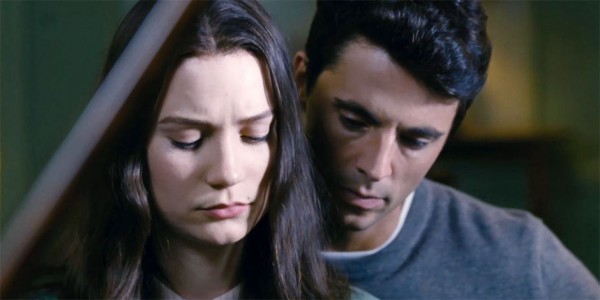
Eight years after Lady Vengeance and with a couple of bizarre directorial films released (including a romantic comedy and a vampire romance movie), Park Chan-wook made his English-language debut with an unofficial remake of Alfred Hitchc*ck‘s Shadow of a Doubt from 1943. Starring Nicole Kidman, Matthew Goode and Mia Wasikowska, this homage to Hitchc*ck takes the opposite route to a film such as Gus Van Sant‘s Psycho remake (which was a shot-for-shot tribute) and instead leaves only the most simple of narrative details in – namely, there is a normal family, a mysterious Uncle Charlie visits them, and things deteriorate from there. Hitchc*ck‘s original has become synonymous with the director’s inclination to make the lead villain likeable, with Shadow of a Doubt making the characters and the audience doubt Charlie’s intentions as the drama reveals itself (helped dramatically by a brilliant acting turn by Joseph Cotten).
Stoker abandons the honeymoon period of the drama entirely, with Matthew Goode playing Charlie from the outset as a complete sociopath – Park Chan-wook begins the tone of the film at the point from where Hitchc*ck left off and proceeds to ratchet up the extremity of the events and the horror of the household until it is unrecognisable from anything Hitchc*ck ever made. Violence and sex were always present in Hitchc*ck‘s work, through subtle imagery or otherwise, but here Chan-wook unforgettably links the two themes in perverse imagery of arousal through murder – imagery that blurs the lines between protagonist and antagonist.
The Handmaiden (2015)
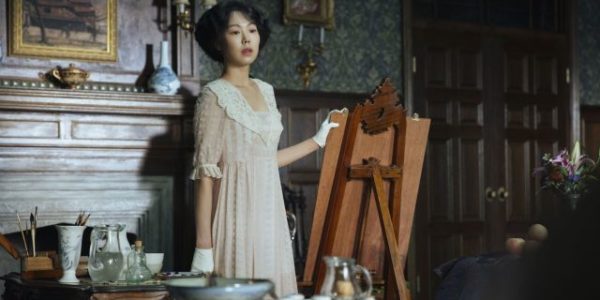
The final film on this list, the most recent of Park Chan-wook‘s filmography, is the extraordinary and totally unique erotic-thriller The Handmaiden. Based upon the English language novel “Fingersmith”, this delightfully twisted and sexually charged thriller is sweeping in its posture, playing almost as a haunted-house film as well as an erotic melodrama that is drenched in deliberate cliche, occasional wit and then, finally, violence and madness.
In early twentieth century Korea, a young thief named Sook-hee is employed by an expert con-man, under the pseudonym of ‘The Count’, to become the maid of an unstable young heiress and trick her into giving away her inheritance. What follows is a twisting tale that is charged by not only the sexual energy that so dominated its overall reaction to the press, but also a kind of horror that lurks beneath the surface of the house they occupy, with its ominous paintings and hidden peepholes.
Through the horror and the madness, the suicide and the sex, it is strange (and exciting) to contemplate The Handmaiden‘s rich, and surprising, sense of humour. All of Chan-wook‘s earlier motifs are here with this (although it has a certain surrealism in its early scenes that appear unique) – we saw what the director can achieve with eroticism countless times in Stoker. The black sense of humour here, though, is an exciting taste of what may be in store for Chan-wook further into his career.
But, for now, The Handmaiden remains a film difficult to define, fluidly encompassing each and every genre of its choosing and, despite the extreme sexual nature of some of its content, remains a fascinating dive into ideas of feminism – a text that seems to homage pornography, before dramatically setting its female characters free of it.
What is Park Chan-wook’s best film so far? There is a suggestion that he will do a science-fiction film next, is that a good fit? Tell us in the comments below!
Does content like this matter to you?
Become a Member and support film journalism. Unlock access to all of Film Inquiry`s great articles. Join a community of like-minded readers who are passionate about cinema - get access to our private members Network, give back to independent filmmakers, and more.
Jack is a recent MA Graduate from the film department at the University of Southampton. He has been writing about film and football casually since 2013, considering himself as an expert on the works of Akira Kurosawa, Park Chan-wook and Steve McQueen ; less of an expert on every other important director.






